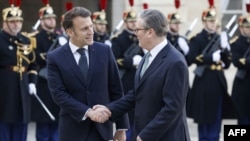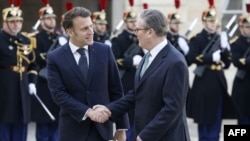French President Emmanuel Macron hosted European leaders Monday for talks focused on the U.S. push to start Russia-Ukraine peace negotiations, seemingly set to proceed without the involvement of European officials.
The leaders of Britain, Germany, Italy, Poland, Spain, the Netherlands and Denmark, along with NATO chief Mark Rutte, European Council President Antonio Costa and European Commission President Ursula von der Leyen began arriving in Paris for the hastily called meeting.
The discussions came in the aftermath of last week’s phone call between U.S. President Donald Trump and Russian President Vladimir Putin, in which the two leaders agreed to start immediate talks to end Russia’s three-year war on its neighbor, but at least initially without the involvement of Ukrainian or European leaders.
U.S. Secretary of State Marco Rubio is in Saudi Arabia where he is scheduled to meet Tuesday with Russian officials for discussions about the war. Rubio is being joined in the talks by two other key U.S. officials, Trump’s national security adviser, Mike Waltz, and his Middle East envoy, Steve Witkoff.
State Department spokeswoman Tammy Bruce described the Riyadh discussions as “a follow-up” to the Trump-Putin call but said, “I don't think people should view this as something that is about details or moving forward in some kind of a negotiation.”
It does not appear that any Ukrainian officials will join the talks, even as Ukrainian President Volodymyr Zelenskyy has repeatedly said he will not accept a U.S.-Russian dictate on Ukraine’s future and that Ukraine must be involved in any settlement of the conflict.
Russia now holds about 20% of Ukraine’s internationally recognized territory, including the Crimean Peninsula that Moscow unilaterally annexed in 2014 and much of eastern Ukraine.
After arriving in Paris, von der Leyen said on X, “Europe’s security is at a turning point. Yes, it is about Ukraine — but it is also about us. We need an urgency mind-set. We need a surge in defense. And we need both of them now.”
European officials have expressed fear that Trump might pull U.S. troops out of Europe or negotiate an end to the Russian war on Ukraine on terms more favorable to Moscow than Kyiv. Under former President Joe Biden, the U.S. and European allies uniformly supported Ukraine and supplied them with billions of dollars’ worth of weaponry.
Additionally, European officials were shocked last week by U.S. Vice President JD Vance’s speech in Munich in which he assailed Europe for excluding far-right groups from power and what it might portend for future U.S.-European relations.
Meanwhile, Trump last year at a political debate declined to say he wanted Ukraine to win the war. More lately he has suggested that Ukraine hand over some of its rare earth minerals needed for U.S. technology manufacturing as compensation for the military aid Washington has supplied it.
European leaders have in recent days pledged continued support for Ukraine, including British Prime Minister Keir Starmer saying his government was ready to send troops to Ukraine as part of any postwar peacekeeping force.
"I do not say that lightly," he wrote Sunday in the Daily Telegraph. "I feel very deeply the responsibility that comes with potentially putting British servicemen and women in harm's way."
Starmer said securing a lasting peace in Ukraine was essential to deter Putin from further aggression.
Sweden’s Prime Minister Ulf Kristersson said Monday his country would not rule out contributing troops to a peacekeeping force that has a “clear mandate.”
The European Council’s Costa said last week’s Munich Security Conference showed the clear message that the security of Ukraine and the European Union “cannot be separated.”
“There will be no credible and successful negotiations, no lasting peace, without Ukraine and without the European Union.” Costa said.
Kremlin spokesperson Dmitry Peskov told reporters Monday the Russian delegation at the Riyadh talks with the U.S. would include Foreign Minister Sergey Lavrov and Yuri Ushakov, a foreign policy adviser to Putin.
Even though the Riyadh talks are the first effort at ending the war since shortly after it began in 2022, Rubio told CBS’s “Face the Nation” in an interview that aired Sunday, “A process towards peace is not a one-meeting thing.”
"We'll see in the coming days and weeks if Vladimir Putin is interested in negotiating an end to the war in Ukraine, in a way that is sustainable and fair,” Rubio said.
Whatever occurs this week in Saudi Arabia, Rubio said that once "real negotiations" begin, then Ukraine "will have to be involved.”
In an interview with NBC’s “Meet the Press” that aired Sunday, Zelenskyy said, “I will never accept any decisions between the United States and Russia about Ukraine. Never. The war in Ukraine is against us, and it is our human losses.”
Zelenskyy said he told Trump in a call they had last week that Putin is only pretending to want peace.
“I said that he is a liar. And [Trump] said, ‘I think my feeling is that he's ready for these negotiations.’ And I said to him, ‘No, he's a liar. He doesn't want any peace.’"
Zelenskyy said that without continued U.S. military support, “Probably it will be very, very, very difficult” to defeat Russia. “And of course, in all the difficult situations, you have a chance. But we will have low chance — low chance to survive without support of the United States.”
Some information for this story came from The Associated Press, Agence France-Presse and Reuters.














